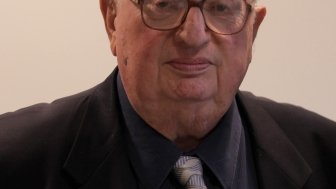Murray Feshbach
Former Senior Scholar
Professional Affiliation
Research Professor Emeritus, School of Foreign Service, Georgetown University, Washington, D.C.
Expert Bio
Murray Feshbach was a Kennan Institute Fellow in 1979-1980, and the author of the first Occasional Paper published at the Kennan Institute. He worked from 1957-1981 with the U.S. Census Bureau studying the demographics of the Soviet Union. His research notably uncovered an unexpectedly high infant mortality rate in the Soviet Union based on cross-checking notoriously unreliable Soviet statistics. He passed away on October 25, 2019.
Wilson Center Project
"Policy Implications of Population, Health, and Environment Trends in Russia"
Major Publications
- The Early Days of the HIV/AIDS Epidemic in the Former Soviet Union, Prepared for the Conference on "Health and Demography in the Former Soviet Union," Harvard University, April 2005
- HIV/AIDS in Ukraine: An Analysis of Statistics, with Cristina M. Galvin, Research Associate, March 2005
- HIV/AIDS in the Russian Military – Update*, Prepared for UNAIDS Meeting, 22-23 February 2005, Copenhagen, Denmark
- Potential Social Disarray in Russia Due to Health Factors
- HIV/AIDS in Russia: An Analysis of Statistics, written with Cristina M. Galvin, Research Associate, January 2005
- "Russia's Health and Demographic Crises: Policy Implications and Consequences," Health and National Security Series (Chemical and Biological Arms Control Institute, April 2003)
- "A Country on the Verge," op-ed, The New York Times, May 31, 2003
- "Russia's Demographic and Health Meltdown," U.S. Congress, Joint Economic Committee, Russia's Uncertain Economic Future, 107th Congress, 1st Session (Government Printing Office, December 2001)
- Ecological Disaster: Cleaning up the Hidden Legacy of the Soviet Regime (The Twentieth Century Fund Press, 1995)
Previous Terms
October 1, 2000 - September 1, 2006: Demographics in Russia, health and environment; October 1, 1979 - August 1, 1980: Comparative Study of Soviet and American Society During World War II
Insight & Analysis by Murray Feshbach
- Article
The Wilson Center Mourns the Loss of Murray Feshbach

- Publication
- Cold War
The USSR and Sources of Soviet Policy (1978)
- By
- William G. Hyland,
- William Luers,
- Klaus Mehnert,
- and 8 more

- Publication
- History
Demography and Soviet Society: Social and Cultural Aspects (1981)

- Publication
- History
The Structure and Composition of the Soviet Industrial Labor Force (1977)

- Past event
- Cold War
Drug-Resistant TB in Russia


